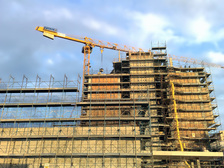
A Knowledgeable Writer is needed in Engineering
In general, engineers are problem solvers. The problems that they solve will depend on the area of engineering that they generally focus on. For example, a chemical engineering may focus on bio-molecular or metallurgical problems, whereas mechanical engineers may look for designs focused on acoustical or thermal issues.
However, engineering is an extremely complex industry, which often means that although the professionals within it may be able to communicate with one another quite easily, they struggle to communicate clearly with less informed individuals.
A technical writer is an individual who can write concise, clearly written documentation capable of communicating complex information to a specific target audience. For an engineer, this could mean writing user manuals on civil engineering areas such as geo-technical engineering or environmental issues, or creating design specifications and documentation for computer engineers.
The Advantage of Using a Technical Writer
The realm of engineering has many different branches and specialties to consider. However, the right technical writer will be versatile and educated enough to understand and provide documentation for you regardless of your specific area. One of the great things about technical writers is that they are always prepared to research and track down the information that is necessary for a specific job. A technical writer can:
o Keep your audience in mind whilst communicating technical information.
o Use pictures, charts, tables, columns, and graphs to convey data that may not be accurately described using words alone.
o Create clear and accurate presentations of descriptive details, information, and facts.
o Write for both the experts in the field and the general public too.
o Create documentation in the form of handbooks, manuals, guidelines, and formal requests.
When an engineer uses the right professional writer, they will be able to rest assured that their writer will thoroughly research the subject material and create something that reflects well upon the individual, or the company overall.
Writing for the Intended Audience
When it comes to writing technical content, data on civil engineering that is intended to provide information to the general public may be more simplified than a manual on biochemical engineering practice. The reason for this is that the latter audience may have a greater depth of knowledge into the subject than the general public. Whatever your needs, the LT Technical Writing will tailor documentation to fit them perfectly.
In general, engineers are problem solvers. The problems that they solve will depend on the area of engineering that they generally focus on. For example, a chemical engineering may focus on bio-molecular or metallurgical problems, whereas mechanical engineers may look for designs focused on acoustical or thermal issues.
However, engineering is an extremely complex industry, which often means that although the professionals within it may be able to communicate with one another quite easily, they struggle to communicate clearly with less informed individuals.
A technical writer is an individual who can write concise, clearly written documentation capable of communicating complex information to a specific target audience. For an engineer, this could mean writing user manuals on civil engineering areas such as geo-technical engineering or environmental issues, or creating design specifications and documentation for computer engineers.
The Advantage of Using a Technical Writer
The realm of engineering has many different branches and specialties to consider. However, the right technical writer will be versatile and educated enough to understand and provide documentation for you regardless of your specific area. One of the great things about technical writers is that they are always prepared to research and track down the information that is necessary for a specific job. A technical writer can:
o Keep your audience in mind whilst communicating technical information.
o Use pictures, charts, tables, columns, and graphs to convey data that may not be accurately described using words alone.
o Create clear and accurate presentations of descriptive details, information, and facts.
o Write for both the experts in the field and the general public too.
o Create documentation in the form of handbooks, manuals, guidelines, and formal requests.
When an engineer uses the right professional writer, they will be able to rest assured that their writer will thoroughly research the subject material and create something that reflects well upon the individual, or the company overall.
Writing for the Intended Audience
When it comes to writing technical content, data on civil engineering that is intended to provide information to the general public may be more simplified than a manual on biochemical engineering practice. The reason for this is that the latter audience may have a greater depth of knowledge into the subject than the general public. Whatever your needs, the LT Technical Writing will tailor documentation to fit them perfectly.

